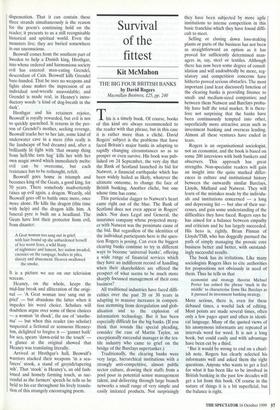Survival of the fittest
Kit McMahon
THE BIG FOUR BRITISH BANKS by David Rogers Macmillan Business, £25, pp. 240
This is a timely book. Of course, books of this kind are always recommended to the reader with that phrase, but in this case it is rather more than a cliché. David Rogers' subject is the problems that have faced Britain's major banks in adapting to rapidly changing circumstances so as to prosper or even survive. His book was pub- lished on 24 September, the very day that the Bank of Scotland launched its bid for Natwest, a financial earthquake which has been widely hailed as likely, whatever the ultimate outcome, to change the face of British banking. Another cliché, but one whose time has come,
This particular dagger to Natwest's heart came right out of the blue. The Bank of Scotland does not even appear in Rogers' index. Nor does Legal and General, the insurance company whose projected merg- er with Natwest was the proximate cause of the bid. But regardless of the identities of the individual participants here is the ques- tion Rogers is posing. Can even the biggest clearing banks continue to try in different ways to become 'universal banks', offering a wide range of financial services which they have an indifferent record of handling when their shareholders are offered the prospect of what seems to be much more sharply focussed management of their core business?
All traditional industries have faced diffi- culties over the past 20 or 30 years in adapting to massive increases in competi- tion stemming from deregulation and glob- alisation and to the explosion of information technology. But it has been especially difficult for the big banks. (If you think that sounds like special pleading, consider the case of Martin Taylor, an exceptionally successful manager in the tex- tile industry who came to grief on the bridge of the Barclays supertanker.) Traditionally, the clearing banks were very large, hierarchical institutions with a strongly anti-competitive, almost public sector culture, drawing their staffs from a pool poor in potential senior management talent, and delivering through large branch networks a small range of very simple and easily imitated products. Not surprisingly they have been subjected by more agile institutions to intense competition in this basic franchise which they have found diffi- cult to meet.
Selling or closing down loss-making plants or parts of the business has not been as straightforward an option as it has proved for sufficiently determined man- agers in, say, steel or textiles. Although there has now been some degree of consol- idation and will undoubtedly be more, reg- ulatory and competition concerns have hitherto proved serious obstacles. The most important (and least discussed) function of the clearing banks is providing finance to small- and medium-sized companies; and between them Natwest and Barclays proba- bly have half the total market. It is there- fore not surprising that the banks have been continuously tempted into other, superficially more attractive areas such as investment banking and overseas lending. Almost all these ventures have ended in tears.
Rogers is an organisational sociologist, not an economist, and the book is based on some 200 interviews with both bankers and observers. This approach has great strengths. Non-specialist readers will gain an insight into the quite marked differ- ences in culture and institutional history between the outwardly similar Barclays, Lloyds, Midland and Natwest. They will learn of the mistakes made by the individu- als and institutions concerned — a long and depressing list — but also of their suc- cesses, and gain some understanding of the difficulties they have faced. Rogers says he has aimed for a balance between empathy and criticism and he has largely succeeded. His hero is, rightly, Brian Pitman of Lloyds/TSB, who has doggedly pursued the path of simply managing the prosaic core business better and better, with outstand- ingly successful results.
The book has its irritations. Like many sociologists Rogers likes to cite authorities for propositions not obviously in need of them. Thus he tells us that
economist and strategy theorist Michael Porter has coined the phrase 'stuck in the middle' to characterise firms like Barclays as it pursued its investment banking strategy.
More serious, there is, even for these debased times, a woeful lack of editing. Most points are made several times, often only a few pages apart and often in identi- cal language. Many of the quoted views of his anonymous informants are repeated at intervals word for word. It is not a long book, but could easily and with advantage have been cut by a third.
' But it would be wrong to end on a churl- ish note. Rogers has clearly selected his informants well and asked them the right questions. Anyone who wants to get a feel for what it has been like to be involved in British banking in the past few decades will get a lot from this book. Of course in the nature of things it is a bit superficial, but the balance is right.


















































































 Previous page
Previous page